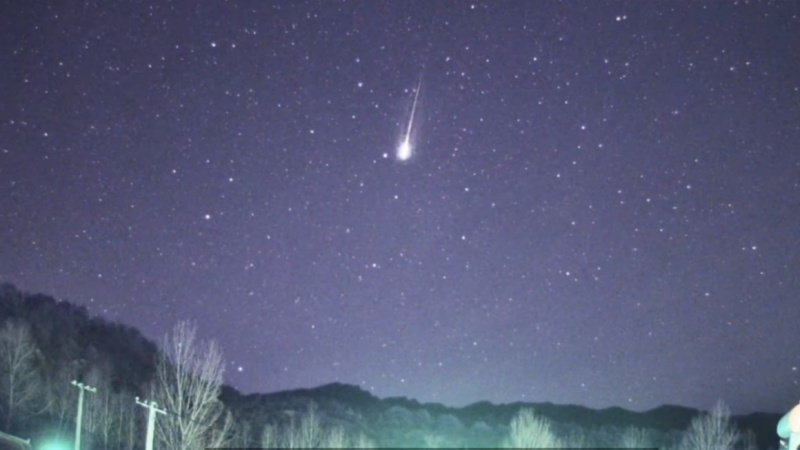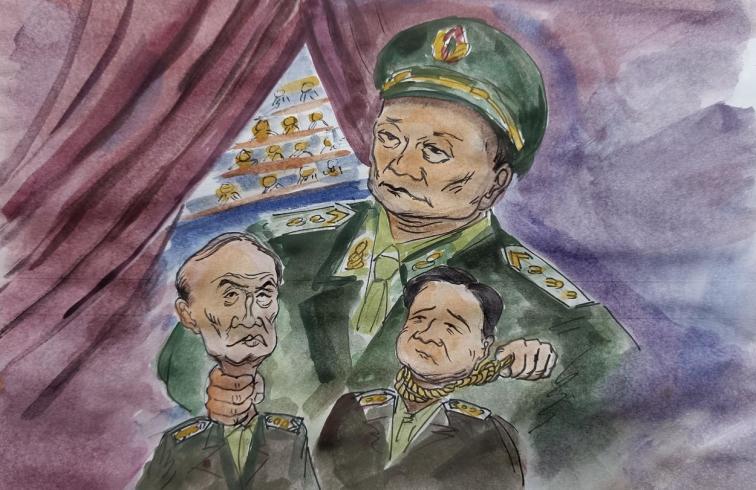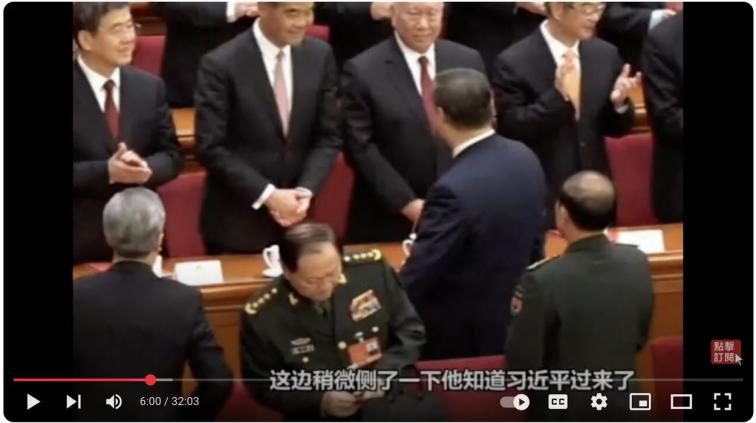In the early hours of the opening day of the Two Sessions this March, two massive fireballs streaked across the night sky in Beijing, falling from the sky and exploding mid-descent. (Image from the internet)
[People News] The recent funerals of former CCP Central Military Commission Vice Chairman Xu Qiliang and former NPC Vice Chairman Raidi (Re Di) have drawn intense attention. Beneath the surface of solemn ceremony, keen observers in political circles noted signs of fierce undercurrents. The two events revealed a power struggle between Xi Jinping’s faction and the anti-Xi camp. Former CCP General Secretary Hu Jintao and current CMC Vice Chairman Zhang Youxia have now openly broken with Xi. According to the political commentary show Jiang Feng’s World, Xi had personally called Hu Jintao to invite him to Xu Qiliang’s funeral, but Hu refused.
Xi’s Faction Set a Trap at Xu Qiliang’s Funeral — Hu Jintao Refused to Play Along
Xinhua News reported on June 8 that during Xu Qiliang’s illness and after his death, "Xi Jinping, Li Qiang, Zhao Leji, Wang Huning, Cai Qi, Ding Xuexiang, Li Xi, Han Zheng, and Hu Jintao" all expressed deep condolences in person or via various means.
State media footage of the funeral showed Hu Jintao’s wreath placed even behind those of the seven Politburo Standing Committee members. Commentator Jiang Feng said this wasn’t a mistake — it was a deliberate signal of a public rift between Hu and Xi.
An insider revealed that Hu likely didn’t send the wreath himself. Jiang Feng cited multiple sources and explained the background, starting with a phone call.
After Xu’s death, Xi wanted to use the funeral as a political display of unity to signal stability in the military and party. Cai Qi reportedly suggested that Xi call Hu Jintao personally to invite him to attend. If Hu showed up, it would imply Xu wasn’t Xi’s scapegoat but rather a respected party veteran. Even if Hu declined but sent a wreath, it could still provide footage showing "unity." A handshake or standing together would be used to pacify doubts about instability in the army.
According to the insider, Hu ignored Xi’s calls for several days. When he finally picked up, he replied coldly: “I’m not well. I won’t attend.” No thanks, no pleasantries — not even a polite formality.
Jiang Feng said anyone familiar with CCP politics knows this was a clear break. But why was Hu’s wreath still there at the scene?
One possibility: Xi’s side faked it. They arranged a wreath to create the illusion of Hu’s participation. However, the plan backfired when the wreath wasn’t placed among the top leaders’ offerings. The protocol team, unwilling to take risks, placed it with those from other senders since it wasn’t personally delivered. This attempt to “boost” Xi’s image ended up exposing the rift.
A second possibility: Hu did send the wreath, but intentionally demanded it be placed in that lower position — a quiet but pointed protest. “You want a show of party unity? Too bad. I won’t follow your script.”
Jiang Feng called this an implicit act of defiance from within the red walls of Zhongnanhai. Either way, the message is clear: the break is public and final. From being escorted out of the 20th Party Congress, to not attending the funeral, to the misplaced wreath — it’s a full progression of rejection. Hu Jintao has shifted from passive tolerance to active opposition.
Raidi’s Funeral and the “Disappeared Name” — Zhang Youxia’s Counterstrike
On June 12, Xi Jinping again appeared at Babaoshan for the funeral of Raidi, a vice-state-level official. State TV footage showed all seven Politburo Standing Committee members attending, and also highlighted Hu Jintao’s wreath again. But this time, there was an oddity: among the sixteen non-Standing Committee Politburo members, only Zhang Youxia’s name was not clearly shown. Only part of the character "Zhang" was faintly visible — the rest of the name was covered.
Commentator Zhao Ming on X (Twitter) noted that He Lifeng’s name overlapped with Zhang’s. He speculated this was deliberate — a petty and pointed political retaliation, revealing how deeply Xi’s camp now resents Zhang Youxia.
Observers say Zhang’s authority in the military has begun to eclipse Xi’s.
After the 20th Party Congress in 2022, the early phase of the military anti-corruption campaign targeted the Rocket Force and the Equipment Development Department — both tied to Zhang. Some saw this as an indirect attempt to push Zhang out. Internal notices even restricted investigations to a timeframe ending when Zhang’s term as Equipment Department head concluded, reinforcing the impression of pressure.
But since April 2024, the wind has shifted. Anti-corruption probes are now targeting Xi’s own core loyalists in the military. First, Xi’s longtime aide Zhong Shaojun was reassigned to the National Defence University — a demotion. Then Miao Hua, a major personnel manager in the army, was placed under investigation. Most importantly, Xi’s trusted CMC Vice Chairman He Weidong has been missing for months. At both Xu Qiliang and Raidi’s funerals, all 24 Politburo members sent wreaths — except He Weidong, fueling speculation he’s been purged.
Though Zhang was retaliated against by Xi during Raidi’s funeral, he responded just hours later. In a rare high-level internal speech, Zhang declared: “Wrong policies must be held accountable.” Jiang Feng sees this as Zhang and Hu coordinating their challenge to Xi: one refuses to appear, the other sends a signal. It’s the beginning of a political campaign to repudiate Xi’s leadership.
On May 19–20, Xinhua and People’s Daily front pages ran a major article titled "Insisting on Scientific, Democratic, and Law-Based Decision-Making to Complete the 15th Five-Year Plan in High Quality." The piece revived Hu Jintao–era slogans like “scientific development” but made no mention of Xi Jinping Thought — a highly unusual omission. Analysts believe this signals the return of Hu Jintao and the looming exit of Xi Jinping.
A recent report by the China Aerospace Studies Institute (CASI), a U.S. Air Force think tank, stated that the Chinese military is unable to complete key reforms needed to achieve the combat readiness required to seize Taiwan by 2027. The report quoted an earlier article by Zhang Youxia, who admitted the army could not meet Xi’s demands for a Taiwan invasion by 2027. △
(First published by People News)










News magazine bootstrap themes!
I like this themes, fast loading and look profesional
Thank you Carlos!
You're welcome!
Please support me with give positive rating!
Yes Sure!